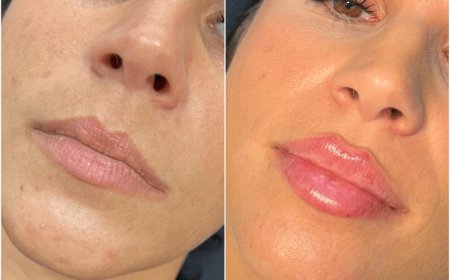Mental Health for Teens in Georgia: Challenges, Support, and Solutions
Explore teen mental health challenges and discover how Georgia mental health services support adolescents with care, therapy, and resources.
Adolescence is a time of rapid changephysically, emotionally, and socially. For many teens in Georgia, these changes are accompanied by stress, anxiety, depression, and other mental health concerns. As academic pressure intensifies and social dynamics grow more complex, teen mental health is becoming a critical issue across the state. While awareness is increasing, gaps in care and support remain.
This blog explores the current state of teen mental health in Georgia, the challenges young people face, and how the georgia mental health system is responding to support the next generation.
The Growing Mental Health Crisis Among Georgia Teens
Teen mental health challenges are on the rise nationwide, and Georgia is no exception. According to recent surveys, a significant number of high school students in Georgia report feelings of hopelessness, isolation, or overwhelming anxiety. In some cases, these symptoms can lead to risky behavior, academic struggles, self-harm, or suicidal thoughts.
Contributing factors include:
-
Academic stress and pressure to perform
-
Bullying and social exclusion, both in-person and online
-
Family instability or conflict at home
-
Substance use or exposure to addiction
-
Unaddressed trauma or abuse
-
Social media overuse and body image issues
Understanding these influences is vital to tailoring effective responses within the georgia mental health framework for adolescents.
Common Mental Health Disorders Among Teens
Teenagers are susceptible to many of the same mental health conditions as adults, but these often present differently in younger individuals. Some of the most common diagnoses include:
-
Anxiety Disorders: Generalized anxiety, panic attacks, and social anxiety are increasingly reported in teens.
-
Depression: Persistent sadness, irritability, or loss of interest in activities.
-
ADHD: Often diagnosed in childhood but may continue into adolescence, affecting focus and behavior.
-
Eating Disorders: Anorexia, bulimia, and binge-eating disorders are more common among teen girls but affect boys as well.
-
Substance Use Disorders: Often co-occur with untreated mental health conditions.
-
Trauma-Related Disorders: PTSD or chronic emotional distress due to violence, neglect, or loss.
Early identification and treatment are crucial to ensure long-term wellness and academic success.
Barriers to Teen Mental Health Care in Georgia
Despite growing awareness, several barriers prevent teens in Georgia from accessing the mental health care they need.
Stigma and Shame
Many teens fear being judged or misunderstood if they admit to feeling overwhelmed. This stigma often exists at home, among peers, and even in some school environments.
Limited Access to Providers
Rural areas in Georgia continue to experience a shortage of child and adolescent mental health specialists. This shortage affects wait times, care availability, and consistency of treatment.
Cost and Insurance Issues
Even if parents recognize a need for help, financial constraints or lack of insurance coverage may prevent families from seeking therapy.
Parental Unawareness or Denial
Some parents may misinterpret mental health symptoms as normal teenage behavior, delaying crucial early intervention.
Transportation and Scheduling Conflicts
Families with limited transportation options or busy schedules may find it difficult to attend regular appointments, particularly if providers are far from home.
These systemic barriers highlight the need for broader, more equitable georgia mental health access tailored to adolescents.
School-Based Mental Health Programs
One of the most effective ways to reach teens is through school-based mental health programs. Many Georgia schools have begun implementing initiatives to provide counseling, early intervention, and emotional education right on campus.
Key components include:
-
On-site school counselors or psychologists
-
Mental health screening and assessments
-
Anti-bullying programs and conflict resolution training
-
Partnerships with local mental health providers
-
Peer support groups and clubs focused on mental wellness
These programs are essential for identifying at-risk students and connecting them to resources early in the development of mental health concerns.
The Role of Parents and Caregivers
Parents and guardians play a crucial role in supporting teen mental health. Creating an open and non-judgmental environment at home allows teenagers to express themselves and seek help without fear.
Tips for parents include:
-
Listen without immediate judgment or solutions
-
Encourage healthy habits: sleep, exercise, and nutrition
-
Monitor behavior and changes in routine
-
Limit excessive screen time and social media exposure
-
Educate yourself about teen mental health and warning signs
Caregivers who take an active role in promoting emotional wellness help bridge the gap between home and the georgia mental health system.
Recognizing the Warning Signs
Many teens hide their mental struggles, making it important to watch for behavioral and emotional red flags. Common signs include:
-
Sudden changes in academic performance
-
Withdrawing from friends and family
-
Irritability, anger, or mood swings
-
Changes in sleep or eating habits
-
Lack of interest in activities once enjoyed
-
Excessive worry or panic
-
Self-harm behaviors (cutting, burning)
-
Talking about death or suicide
If any of these symptoms are persistent or intensifying, its time to consult a mental health professional.
Treatment Options for Teens in Georgia
There are several treatment avenues available through the georgia mental health system that cater specifically to adolescents.
Individual Therapy
One-on-one sessions with a licensed therapist allow teens to explore thoughts and feelings in a confidential environment.
Family Counseling
Therapy that includes parents or caregivers can help improve communication and resolve home-based conflicts that may affect a teens mental health.
Group Therapy
Group sessions can help teens feel less isolated and gain perspective from peers facing similar challenges.
Medication Management
For certain conditions, such as severe depression or anxiety, a psychiatrist may recommend medication as part of a comprehensive treatment plan.
Crisis Intervention
In cases of immediate risk, Georgia offers crisis hotlines, mobile crisis teams, and emergency walk-in services to stabilize the situation and provide short-term care.
Technology and Teletherapy for Teens
The rise of telehealth has revolutionized the way teens in Georgia access therapy. Many now prefer texting, video calls, or app-based services over traditional face-to-face appointments.
Benefits of teletherapy include:
-
Privacy and discretion
-
Flexible scheduling
-
Access from anywhere, including rural communities
-
Less intimidating for first-time therapy users
These digital platforms are helping close the gap in georgia mental health accessibility for young people, especially those who struggle with transportation or social anxiety.
Community and Peer Support
In addition to professional help, peer support groups, after-school programs, and local youth organizations offer a sense of belonging and purpose. Teens often benefit from shared experiences and encouragement from others going through similar struggles.
These environments also provide safe spaces for discussing mental health, building social skills, and developing resilience.
Preventive Measures and Emotional Education
Prevention is just as important as treatment. Georgia schools, families, and communities are beginning to focus on emotional education to empower teens with tools to manage stress, emotions, and peer relationships.
Preventive strategies include:
-
Mindfulness and relaxation exercises
-
Journaling or creative expression
-
Social-emotional learning (SEL) curricula
-
Open discussions about mental health in schools and homes
These tools are essential for preparing teens to handle future challenges with confidence.
Conclusion
Teen mental health is one of the most pressing public health concerns in Georgia today. While there are still challenges related to access, stigma, and resources, progress is being made through schools, telehealth, family involvement, and community support.
Parents, educators, and policymakers must continue to work together to ensure that the next generation has the tools, support, and resilience they need. With increased awareness and intentional investment, the georgia mental health system can become a nationwide model for supporting teen wellness.
FAQs
Q1. What are the most common mental health issues faced by teens in Georgia?
Anxiety, depression, ADHD, eating disorders, and trauma-related conditions are among the most common. Many teens also struggle with stress and identity issues.
Q2. How can I tell if my teen is experiencing a mental health problem?
Look for behavioral changes such as mood swings, isolation, sleep disturbances, or loss of interest in activities. If symptoms persist, seek professional advice.
Q3. Is therapy confidential for teens in Georgia?
Yes, therapy is generally confidential. However, parents may be informed if the teen is at risk of harming themselves or others, based on legal requirements.
Q4. Are there free or low-cost therapy options for teens in Georgia?
Yes. Many community-based programs and school systems offer free or reduced-cost counseling. Some therapists also offer sliding scale fees based on income.
Q5. Can teens in rural Georgia access therapy?
Absolutely. Teletherapy has expanded across the state, allowing teens in rural areas to connect with licensed professionals through secure digital platforms.









































